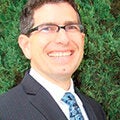TMP Course Descriptions: Period 3

TMP Course Descriptions: Period 3
The course schedule below is for March 23-27, 2026
Period 3: 1:20 PM - 3:20 PM
Course Overview
Personalize your focus of study by selecting a course from the offerings below. Scroll down to read the full course descriptions and instructor profiles for each option.
| Select One | |
|---|---|
| C1 | Card Games for Soft Skills Led by: Colt McAnlis, Principal Architect, NVIDIA |
| C2 | Asking the Right Questions Led by: David Lam, CPP, CISPP, Partner, Miller Kaplan |
| C3 | AI Powered Management: Making Smarter Decisions Led by: Timothy Park, MBA, Executive Director, UCLA Anderson School of Management *Bring your own laptop to class |
| C4 | Leading High Performance Teams Led by: Kevin Groves, Ph.D., President, Groves Consulting Group, LLC |
Ready to register? Complete your enrollment form today.
Full Course Descriptions |
C1 | Card Games for Soft Skills
This course focuses on providing fun, repeatable activities that help improve these “hard to train” skill sets. Each one creates a safe, repeatable situation where each player can try, fail, and learn.
Led by: Colt McAnlis, Principal Architect, NVIDIA
Soft skill development is crucial as a separator between success and failure as your career progresses. Sadly, some skills (such as conflict resolution, hiring/firing, or negotiation) can only be practiced “in the moment”, and unless your job is fraught with these types of situations, you may not advance your skills in these areas as fast as needed.
This course focuses on providing fun, repeatable activities that help improve these “hard to train” skill sets. Each one creates a safe, repeatable situation where each player can try, fail, and learn. Along with the activities, we’ll take a look at the core behavioral patterns for these soft skills and introduce connections between the activities, how the circumstances change, and how this relates to your career and goals.
Along with all the lecture, attendees will walk away with copies of the games so that they can facilitate them with their own teams at work.
Day 1: Intros and The Chaos of Teamwork
The “Too Many Droids” activity helps immerse the team in highly stressful, simulated chaos to accomplish personal activities and help the team accomplish its goals. In this activity players will realize that their strategies for “getting things done” falls apart once the stakes get high enough. As a team they will have to come together, develop a plan for communication, resource sharing, and what to do when things go from bad, to worse.
Day 2: Stress, Triage and Better Teamwork
“Unicorn or Bust!” is an activity that builds resilience against the day-to-day chaos of projects & problems. In this activity players take the role of a new startup company trying to go 52 weeks from startup to IPO. Along the way, the team will have to share resources, agree on strategy, and try to solve problems before they run out of funding... or worse!
Day 3: Communicating with Empathy and Intention
“Ship it!” is an activity that helps develop empathetic communication. In this activity, players will quickly have to realize that their team members don’t share the same mental model about how the game should be played, and will have to take it upon themselves to modify their communication process. Giving the wrong information, worded in the wrong way, could spell disaster!
Day 4: Dealing with Transitions
“Re-org” activity that helps players move through planning their impact- focused work, while dealing with unexpected consequences from an administrative level. Your goal is to become the most valuable engineer at your company, which you do by taking on and completing projects. The problem? Every year a re-org happens, and you’ve got a new manager who changes the company priorities. Learn how to adapt to chaos in the workplace, changing design requirements, and how to build a career that can withstand any re-org.
Day 5: Putting it all Together
Day 5 brings an activity that binds together all of the lessons of the week into a single exercise. “Favortown” is a collaborative card game that focuses on hyper-restricted communication to accomplish a shared goal – The team is tasked with accomplishing a set of large goals, where each team member has a unique skill that’s required to solve the problems. The trick? No talking allowed. Teams will use all the skills from this week to plan, negotiate, deal with problems, empathize and deal with the chaos of day-to-day problems, all in 10 minutes at a time.

Colt McAnlis
Principal Architect, NVIDIA
C2 | Asking the Right Questions
Learn the simple art of conversation by Asking the Right Questions to get an ideal result and revolutionize your interactions with others.
Led by: David Lam, CPP, CISSP, Partner, Miller Kaplan
Using a question or making a statement to open a Safe Space for you and your conversational partners to make better decisions. Asking the Right Questions has the following characteristics:
- It gets people to pause and think.
- It often leads to an ‘aha moment.’
- It is focused on getting to an Ideal Final Result.
Asking the Right Questions is very simple. Use a question, make a statement, or use one of the models we’ve defined to open a space for your conversational partners to make better decisions in reaching each ideal final result. By Asking the Right Questions, you not only create a more positive perception of you, team members are more able and willing to implement a joint vision and do it happily. Finally, by asking questions that change the perception that others have of you, you will be more readily able to turn conflict into positive outcomes. Mr. Lam will show you how these life-changing methods actually work and how they can provide a framework for implementing the other skills you learn at TMP.

David Lam, CPP, CISSP
Partner, Miller Kaplan
C3 | AI Powered Management: Making Smarter Decisions
Discover AI Powered Management.
*Bring laptop to class
Led by: Timothy Park, MBA, Executive Director, UCLA Anderson School of Management
Powered Management: Making Smarter Decisions explores data-driven and AI-enhanced strategies for effective leadership and organizational decision-making. Participants will learn how to leverage analytics, automation, and human insight to solve complex business challenges. Hands-on demonstrations will be included.
*Please bring a laptop to participate in interactive exercises and real-world decision-making simulations.

Timothy Park, MBA
Executive Director, UCLA Anderson School of Management
C4 | Leading High Performance Teams
Develop agile leadership competencies for building high-performance teams in the era of digital transformation via experiential skill-building activities (role-playing exercises, team simulations), an assessment of your agile leadership competencies (LEAP Leadership Assessment), and a Leadership Development Plan (LDP).
Led by: Kevin Groves, Ph.D., President, Groves Consulting Group, LLC
This course offers participants a fun, experiential, and highly interactive learning experience that focuses on the development of agile leadership competencies. The course participants will complete the LEAP (Learning, Engaging, Adapting, Persevering) leadership assessment, a validated instrument that measures 20 agile leadership competencies. Examples of agile leadership competencies include strategic insight, innovating thinking, cultivating psychological safety, collaboration skills, and emotional intelligence. The assessment results and key take-aways from each class session will be used to develop a five-part Leadership Development Plan (LDP). The LDP allows participants an opportunity to clearly articulate how they will transfer their learning from the course (and from the TMP more broadly) to the leadership challenges in their job and organizational context. Course participants are offered a series of practical tools, resources, and readings to support the development of their LDPs, including practical strategies and tactics for enhancing all 20 agile leadership competencies.
Participants are encouraged to share the course tools, resources, and exercises with their own teams at work. These resources include the experiential exercises, leadership development tools, leadership development briefs (digital archive of practitioner-focused articles across all 20 leadership competencies), and discussion guides. Outlined below, each of the five course sessions feature experiential learning activities (role-plays, team simulations, etc.) that are designed for participants to develop agile leadership competencies.
Day 1: VUCA Megatrends & Agile Leadership Competencies
Our first session includes an interactive discussion of the VUCA megatrends driving the need for more agile leadership and the implications for emerging business leaders. We focus on how the digital transformation, generational shifts, and other VUCA drivers influence how leaders must engage their teams. Our first session features a fun, highly interactive team-based experiential exercise (the marshmallow challenge) that illustrates the challenges of leading in VUCA environments, and the practical implications for developing leader agility.
Day 2: LEAP Assessment & Emotional Intelligence
Our second session includes the completion of the LEAP (Learning, Engaging, Adapting, Persevering) leadership assessment, and a discussion of how to interpret and apply the results to your Leadership Development Plan (LDP). We discuss all 20 leadership competencies, and how organizations utilize assessments as part of talent review processes (nine-box grids and related succession planning activities). Our second session features an engaging experiential exercise (‘Assigned Leader Group Exercise’) that challenges the participants to build consensus and leverage the experiences and expertise of each team member. This highly interactive and practical exercise allows all participants to reflect upon their LEAP assessment results and develop initial priorities for further development across one or more agile leadership competencies.
Day 3: Building Collaboration Skills & Cultivating Psychological Safety
Our third session focuses on the development of two core agile leadership competencies, specifically collaboration skills and the ability to cultivate psychological safety. We will discuss the five trademarks of agile organizations and examples of leadership agility across organizations (the participants’ organizations as well as Google, Netflix, Nike, and other organizations), and across modalities (face-to-face and virtual context). This session features a series of role-playing exercises in which participants further develop their collaboration skills and ability cultivating psychological safety on work teams.
Day 4: Coaching & Developing Talent
Our fourth session focuses on the development of coaching and talent development skills, which represent essential agile leadership competencies. Participants will engage in interactive discussions and exercises around how agile leadership requires both feedback-giving and feedback-seeking skills. Participants are provided a concise, practical coaching model that includes four phases of a highly effective coaching session and practical strategies for giving and receiving feedback. This session features a series of role-playing exercises in which participants practice applying the coaching model to three coaching challenges that are common for emerging leaders with technical backgrounds.
Day 5: Leader Authenticity & Your Leadership Development Plan (LDP)
The final session focuses on the completion of the Leadership Development Plan (LDP), which includes a targeted action plan for enhancing three leadership competencies that are associated with your current or future job challenges. Participants are provided a list of suggested development strategies and tactics for all 20 agile leadership competencies. This session includes an interactive discussion of leader authenticity, and the importance of reflecting upon your core values and leadership principles as the foundation of your LDP. The session concludes with an engaging and practical discussion of how participants will leverage all of the learnings from their TMP experience for their LDPs and share with their teams at work.

Kevin Groves, Ph.D.
President, Groves Consulting Group, LLC

Register Now
You will select one course from each of the four periods to create your customized schedule.
Please indicate on the reservation form your second and third choices in the event your first selections are not available.

